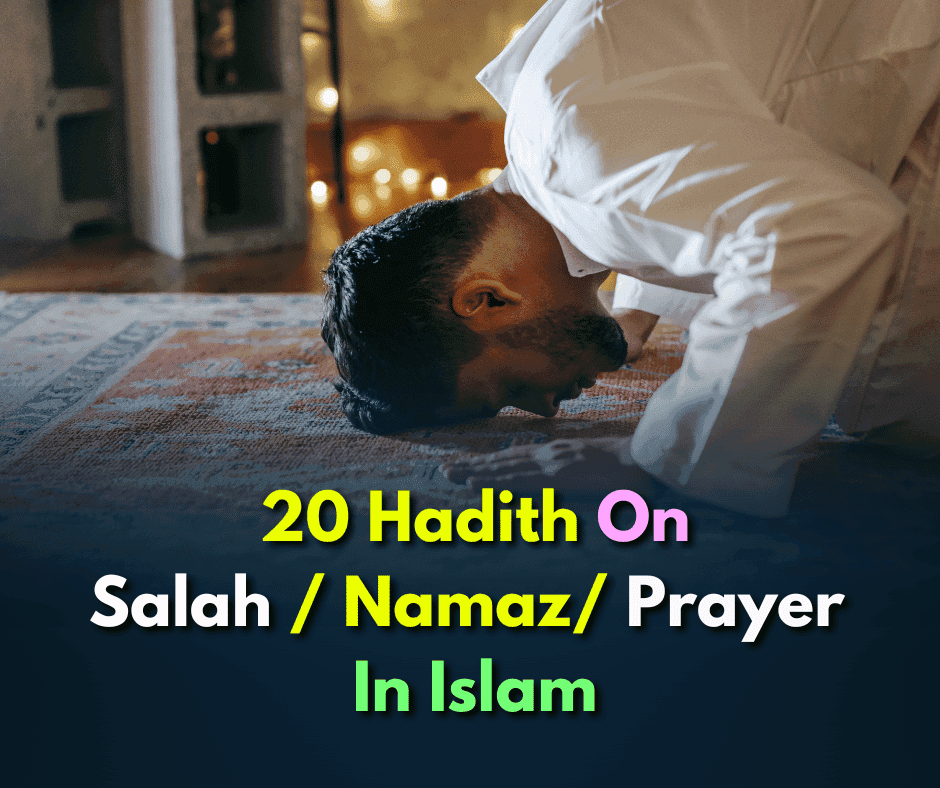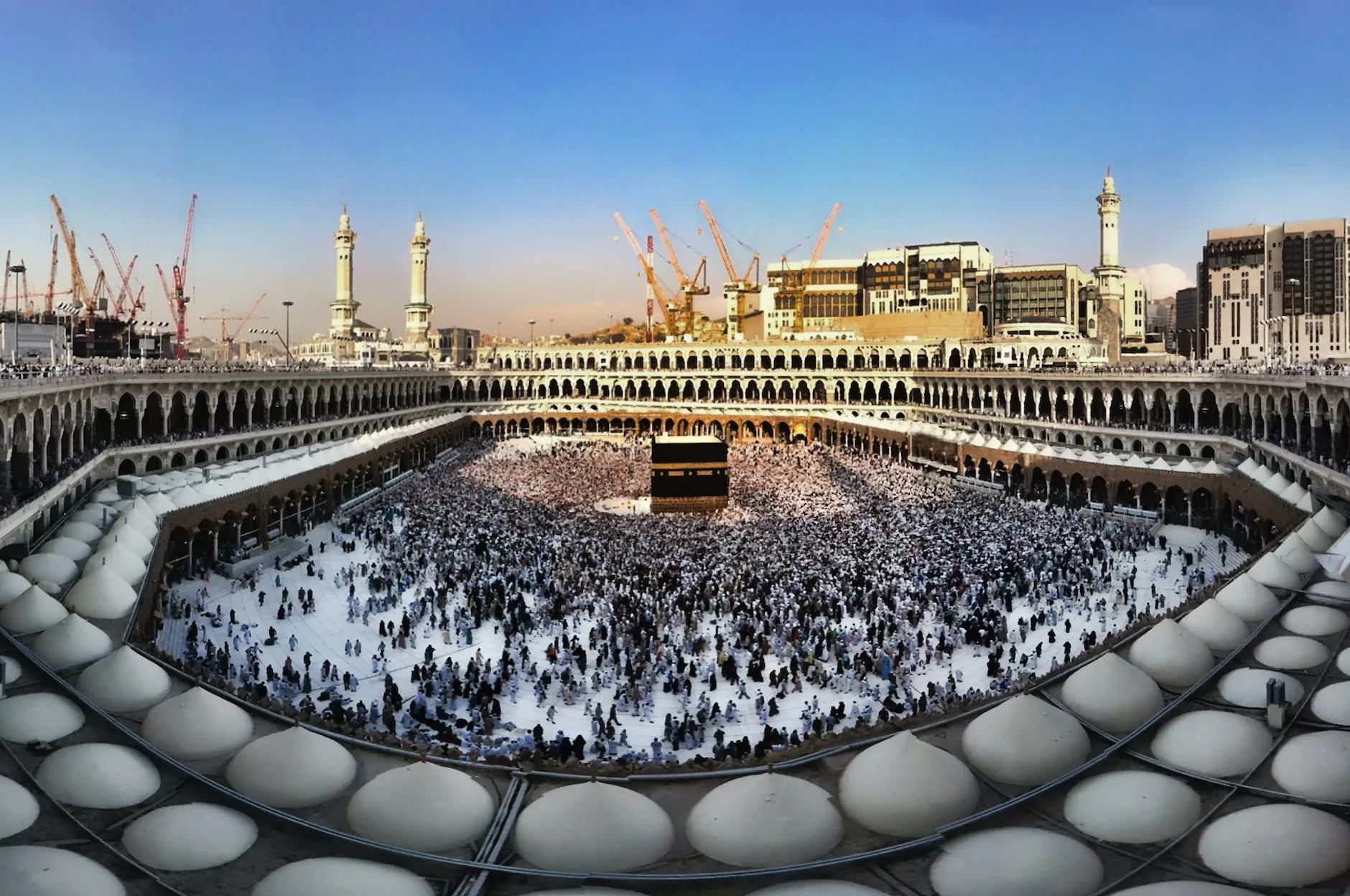
Prayer (Salat) is a very important part of Islam, which creates a direct relationship between a believer and Allah (SWT). So Salah is one of the 5 pillars of Islam.
The five pillars of Islam are the basic norms of Islamic practice:
- Shahadah: The declaration of faith, or Muslim creed, which is the recitation of “There is no God but God and Muhammad is the Messenger of God”
- Salah: Prayer, which is performed five times a day, facing Mecca.
- Zakat: Alms-giving, or obligatory charity, which is the act of setting aside a portion of one’s wealth to help those in need.
- Sawm: Fasting, which is observed during Ramadan.
- Hajj: The pilgrimage to the holy city of Mecca, which is obligatory for every Muslim at least once in their lifetime.
The Qur’an orders the believers to establish Salah and this has been given more priority as the foundation of faith. Prophet Muhammad (PBUH) also explained its importance the most through his words and deeds and we have received very valuable guidance. Come, now let us explore original or authentic ’20 Hadith on Salat’ which will inspire us, teach us and deepen our connection with this essential prayer.
1. Hadith on the Importance of Salat
إِنَّ أَوَّلَ مَا يُحَاسَبُ بِهِ الْعَبْدُ يَوْمَ الْقِيَامَةِ الصَّلَاةُ

Pronunciation:
“Inna awwala ma yuhasabu bihi al-ʿabdu yawma al-qiyāmati as-salāh.”
Meaning:
“The first thing for which a person will be brought to account on the Day of Judgment is the prayer.”
(Sunan Abi Dawood, Hadith 864)
Explanation:
This hadith highlights that Salat is the first act of worship to be judged on the Day of Judgment, indicating its immense significance. A well-established prayer reflects sincerity and obedience to Allah, serving as a criterion for the rest of one’s deeds.
2. Hadith on Salat as a Light
الصَّلاَةُ نُورٌ

Pronunciation:
“As-salāh nūrun.”
Meaning:
“Prayer is a light.”
(Sahih Muslim, Hadith 223)
Explanation:
The “light” referred to in this hadith symbolizes guidance in this world and illumination in the hereafter. Regular prayers cleanse the heart, illuminate the soul, and provide clarity in decision-making.
Islamic Incident:
When Bilal (RA) was chosen to call the Adhan, he felt the transformation of his soul through Salat, illustrating how prayer brings light to the believer’s heart.
3. Hadith on Missing Salat
بَيْنَ الرَّجُلِ وَبَيْنَ الْكُفْرِ تَرْكُ الصَّلاَةِ

Pronunciation:
“Bayna ar-rajuli wa bayna al-kufri tarku as-salāh.”
Meaning:
“Between a person and disbelief is abandoning the prayer.”
(Sahih Muslim, Hadith 82)
Explanation:
This hadith warns of the severe consequences of neglecting Salat, equating it to a step towards disbelief. Maintaining prayer demonstrates faith and commitment to Allah’s commands.
4. Hadith on Salat’s Role in Forgiveness
أَرَأَيْتُمْ لَوْ أَنَّ نَهَرًا بِبَابِ أَحَدِكُمْ يَغْتَسِلُ فِيهِ كُلَّ يَوْمٍ خَمْسَ مَرَّاتٍ، هَلْ يَبْقَى مِنْ دَرَنِهِ شَيْءٌ؟
Pronunciation:
“Ara’aytum law anna nahran bibābi ahadikum yaghtasilu fīhi kulla yawmin khamsa marrātin, hal yabqā min daranihi shay’?”
Meaning:
“If there were a river at the door of one of you, and he washed in it five times a day, would there remain any dirt on him?”
(Sahih Bukhari, Hadith 528)
Explanation:
Prophet Muhammad (PBUH) likened Salat to a cleansing river, illustrating how it purifies the soul from sins. It renews our connection with Allah and clears our spiritual slate.
Islamic Incident:
Umar ibn al-Khattab (RA) would cry in repentance during Salat, reflecting how the act washes away sins and nurtures humility.
5. Hadith on Prostration (Sujood)
أَقْرَبُ مَا يَكُونُ الْعَبْدُ مِنْ رَبِّهِ وَهُوَ سَاجِدٌ
Pronunciation:
“Aqrabu ma yakūnu al-ʿabdu min rabbihi wa huwa sājid.”
Meaning:
“The closest that a servant comes to his Lord is when he is prostrating.”
(Sahih Muslim, Hadith 482)
Explanation:
Sujood is a moment of utmost humility and proximity to Allah. In this position, a believer can seek forgiveness, guidance, and mercy with an open heart.
6. Hadith on Congregational Prayer
صَلاَةُ الْجَمَاعَةِ أَفْضَلُ مِنْ صَلاَةِ الْفَذِّ بِسَبْعٍ وَعِشْرِينَ دَرَجَةً
Pronunciation:
“Salātu al-jamāʿati afḍalu min salāti al-fadh bi-sabʿin wa ʿishrīna daraja.”
Meaning:
“Praying in congregation is twenty-seven times more rewarding than praying alone.”
(Sahih Bukhari, Hadith 619)
Explanation:
This hadith emphasizes the importance of unity and brotherhood in Islam. Congregational prayer fosters communal bonds and increases spiritual rewards.
Islamic Incident:
During the Prophet’s time, Masjid al-Nabawi was a hub for congregational prayers, reinforcing the practice among the Sahaba (RA).
7. Hadith on Reward for Walking to Prayer
مَنْ تَطَهَّرَ فِي بَيْتِهِ ثُمَّ مَشَى إِلَى بَيْتٍ مِنْ بُيُوتِ اللَّهِ لِيَقْضِيَ فَرِيضَةً مِنْ فَرَائِضِ اللَّهِ، كَانَتْ خَطْوَتَاهُ إِحْدَاهُمَا تَحُطُّ خَطِيئَةً، وَالْأُخْرَى تَرْفَعُ دَرَجَةً
Pronunciation:
“Man tatahhar fī baytihi thumma mashā ilā baytin min buyūt Allāh liyaqḍī farīḍatan min farā’iḍ Allāh, kānat khaṭwātāhu iḥdāhumā taḥuṭṭu khaṭī’atan wal-ukhrā tarfaʿu darajatan.”
Meaning:
“Whoever purifies himself in his house and then walks to one of the houses of Allah to perform an obligatory prayer, every step he takes erases a sin and raises him in status.”
(Sahih Muslim, Hadith 666)
Explanation:
This hadith emphasizes the spiritual benefits of walking to the masjid. Each step taken towards prayer not only wipes away sins but also elevates a person’s rank in the sight of Allah.
Islamic Incident:
In the time of the Prophet Muhammad (PBUH), an elderly man named Abu Hurairah (RA) insisted on walking to the masjid despite his frail condition, valuing the immense rewards of each step.
8. Hadith on Prayer in the Masjid
مَنْ غَدَا إِلَى الْمَسْجِدِ أَوْ رَاحَ، أَعَدَّ اللَّهُ لَهُ فِي الْجَنَّةِ نُزُلًا كُلَّمَا غَدَا أَوْ رَاحَ
Pronunciation:
“Man ghadā ilā al-masjid aw rāḥa, aʿadda Allāhu lahu fī al-jannati nuzulan kullamā ghadā aw rāḥa.”
Meaning:
“Whoever goes to the masjid in the morning or evening, Allah prepares for him a place in Paradise every time he goes.”
(Sahih Bukhari, Hadith 662)
Narrated Abu Huraira: The Prophet (ﷺ) said, “Allah will prepare for him who goes to the mosque (every) morning and in the afternoon (for the congregational prayer) an honorable place in Paradise with good hospitality for (what he has done) every morning and afternoon goings.
9. Hadith on Fajr and Isha Prayers
مَنْ صَلَّى الْعِشَاءَ فِي جَمَاعَةٍ فَكَأَنَّمَا قَامَ نِصْفَ اللَّيْلِ، وَمَنْ صَلَّى الصُّبْحَ فِي جَمَاعَةٍ فَكَأَنَّمَا صَلَّى اللَّيْلَ كُلَّهُ
Pronunciation:
“Man ṣallā al-ʿishā’a fī jamāʿah fa-ka’annamā qāma niṣfa al-layl, wa man ṣallā aṣ-ṣubḥa fī jamāʿah fa-ka’annamā ṣallā al-layla kullahu.”
Meaning:
“Whoever prays Isha in congregation, it is as if he has spent half the night in prayer, and whoever prays Fajr in congregation, it is as if he has prayed the entire night.”
(Sahih Muslim, Hadith 656)
Explanation:
This hadith reflects the immense reward of offering Isha and Fajr prayers, especially in congregation. It encourages believers to remain steadfast, particularly during challenging times like early morning.
10. Hadith on Khushu (Devotion) in Prayer
قَدْ أَفْلَحَ الْمُؤْمِنُونَ – الَّذِينَ هُمْ فِي صَلَاتِهِمْ خَاشِعُونَ
Pronunciation:
“Qad aflaha al-mu’minūn, alladhīna hum fī ṣalātihim khāshiʿūn.”
Meaning:
“Successful indeed are the believers who humble themselves in their prayers.”
(Quran 23:1-2)
Explanation:
Humility (Khushu) in Salat is essential to derive its full spiritual benefit. It transforms the prayer into a heartfelt connection with Allah, rather than a mere ritual.
Islamic Incident:
The Prophet (PBUH) would weep in sujood, exemplifying Khushu and teaching the Sahaba the importance of focus and sincerity in prayer.
11. Hadith on Salat as a Shield
الصَّلَاةُ جُنَّةٌ
Pronunciation:
“As-Salātu junnatun.”
Meaning:
“Prayer is a shield.”
(Sahih Muslim, Hadith 223)
Explanation:
This hadith illustrates that Salat acts as a protective barrier against sins and harmful actions. Regular prayer strengthens a believer’s character and keeps them on the straight path.
Islamic Incident:
One of the Sahaba once confessed a weakness for sinful behavior to the Prophet (PBUH), who advised him to remain steadfast in prayer. Over time, the consistent act of worship purified his heart and reformed his conduct.
12. Hadith on the Virtue of Performing Ablution (Wudu) Before Prayer
إِذَا تَوَضَّأَ الْعَبْدُ الْمُسْلِمُ، فَغَسَلَ وَجْهَهُ، خَرَجَ مِنْ وَجْهِهِ كُلُّ خَطِيئَةٍ نَظَرَ إِلَيْهَا بِعَيْنَيْهِ…
Pronunciation:
“Iza tawadda’a al-ʿabdu al-muslimu, faghassala wajhahu, kharaja min wajhihi kullu khaṭī’atin nazara ilayha bi-ʿaynihi…”
Meaning:
“When a Muslim performs ablution, washing his face, every sin committed by his eyes is washed away…”
(Sahih Muslim, Hadith 244)
Explanation:
Performing Wudu not only prepares the body for prayer but also serves as a means of spiritual purification, removing minor sins with every act of cleansing.
13. Hadith on Deliberate Neglect of Salat
فَمَنْ تَرَكَهَا فَقَدْ كَفَرَ
Pronunciation:
“Fa-man tarakahā faqad kafar.”
Meaning:
“Whoever abandons it has committed disbelief.”
(Sunan At-Tirmidhi, Hadith 2622)
Explanation:
This hadith is a strong warning against neglecting prayer, equating its abandonment to an act of disbelief. It highlights the gravity of maintaining Salat as a fundamental pillar of Islam.
14. Hadith on Prayer as the Key to Jannah
مِفْتَاحُ الْجَنَّةِ الصَّلَاةُ

Pronunciation:
“Miftāḥu al-Jannah as-Salāh.”
Meaning:
“The key to Paradise is prayer.”
(Musnad Ahmad, Hadith 5)
Explanation:
This concise hadith emphasizes the centrality of Salat in attaining Allah’s mercy and entering Paradise. Prayer opens the door to countless blessings in this world and the hereafter.
15. Hadith on the Rewards of Voluntary (Nafl) Prayers
مَا مِنْ عَبْدٍ مُسْلِمٍ يُصَلِّي لِلَّهِ كُلَّ يَوْمٍ اثْنَتَيْ عَشْرَةَ رَكْعَةً تَطَوُّعًا غَيْرَ الْفَرِيضَةِ، إِلَّا بَنَى اللَّهُ لَهُ بَيْتًا فِي الْجَنَّةِ
Pronunciation:
“Ma min ʿabd muslim yusalli lillāhi kulla yawmin ithnatay ʿashrata rakʿatan tatawwuʿan ghayra al-farīḍah, illā banā Allāhu lahu baytan fī al-jannah.”
Meaning:
“Whoever prays twelve voluntary Rak‘ahs every day, Allah will build a house for him in Paradise.”
(Sahih Muslim, Hadith 728)
Explanation:
This hadith encourages offering voluntary prayers in addition to obligatory ones, showcasing their immense rewards.
Islamic Incident:
Umm Habiba (RA), the wife of the Prophet (PBUH), narrated this hadith and made it her practice to pray these twelve Rak‘ahs daily.
16. Hadith on Salat as the First Deed Judged
إِنَّ أَوَّلَ مَا يُحَاسَبُ بِهِ الْعَبْدُ يَوْمَ الْقِيَامَةِ مِنْ عَمَلِهِ صَلَاتُهُ

Pronunciation:
“Inna awwala mā yuḥāsabu bihi al-ʿabdu yawma al-qiyāmati min ʿamalihi ṣalātuhu.”
Meaning:
“The first deed for which a person will be called to account on the Day of Judgment is their prayer.”
(Sunan An-Nasa’i, Hadith 3996)
Explanation:
This hadith underscores the importance of Salat as the primary act of worship that will be assessed on the Day of Judgment. If Salat is performed correctly, it sets the tone for the judgment of other deeds.
Islamic Incident:
The Sahaba were extremely meticulous about their prayers, often asking for reminders and seeking guidance to perfect their Salat, knowing it would be their first test in the Hereafter.
17. Hadith on the Virtue of Fajr and Asr Prayers
مَنْ صَلَّى الْبَرْدَيْنِ دَخَلَ الْجَنَّةَ

Pronunciation:
“Man ṣallā al-bardayn dakhala al-Jannah.”
Meaning:
“Whoever prays the two cool prayers (Fajr and Asr) will enter Paradise.”
(Sahih Bukhari, Hadith 574)
Explanation:
The “cool prayers” refer to Fajr and Asr, times when physical and mental effort is often required to leave daily routines and focus on worship. This hadith encourages believers to ensure these prayers are not missed.
Islamic Incident:
During the time of the Prophet (PBUH), the Masjid was often filled with worshippers during Fajr and Asr, showing the dedication of the early Muslim community to these specific prayers.
18. Hadith on Salat as a Light
وَالصَّلَاةُ نُورٌ

Pronunciation:
“Waṣ-ṣalātu nūrun.”
Meaning:
“And prayer is a light.”
(Sahih Muslim, Hadith 223)
Explanation:
Prayer illuminates a believer’s life, providing guidance, clarity, and inner peace. It also serves as a spiritual light that will shine on the Day of Judgment.
Islamic Incident:
The Prophet (PBUH) often described how prayer guided him during trials and hardships, referring to Salat as his “comfort and light.”
19. Hadith on the Benefits of Consistent Salat
مَنْ حَافَظَ عَلَى الصَّلَوَاتِ كَانَتْ لَهُ نُورًا وَبُرْهَانًا وَنَجَاةً يَوْمَ الْقِيَامَةِ

Pronunciation:
“Man ḥāfaẓa ʿala aṣ-ṣalawāti kānat lahu nūran wa burhānan wa najātan yawma al-qiyāmah.”
Meaning:
“Whoever guards his prayers, they will be a light, proof, and salvation for him on the Day of Judgment.”
(Musnad Ahmad, Hadith 658)
Explanation:
Consistency in prayer safeguards a believer from falling into heedlessness, offering divine assistance and salvation in the Hereafter.
Islamic Incident:
The companions of the Prophet (PBUH) were known for their punctuality in prayer, even during battle or travel, demonstrating their unwavering commitment.
20. Hadith on the Reward for Congregational Prayer
صَلَاةُ الْجَمَاعَةِ أَفْضَلُ مِنْ صَلَاةِ الْفَذِّ بِسَبْعٍ وَعِشْرِينَ دَرَجَة

Pronunciation:
“Ṣalātu al-jamāʿati afḍalu min ṣalāti al-fad bi-sabʿin wa-ʿishrīna darajatan.”
Meaning:
“Praying in congregation is twenty-seven times more rewarding than praying alone.”
(Sahih Bukhari, Hadith 645)
Explanation:
Congregational prayer enhances the spirit of unity and mutual support among Muslims while multiplying the reward for worship.
Islamic Incident:
The Prophet (PBUH) emphasized congregational prayer, often leading it himself. He once delayed starting a prayer to ensure a blind companion was escorted safely to the masjid to join the congregation.
Conclusion
Salat is not merely a ritual but a profound act of devotion that shapes a Muslim’s life. By understanding and implementing the teachings from these authentic hadiths, we can strengthen our relationship with Allah and attain success in both worlds.
Also Read:


